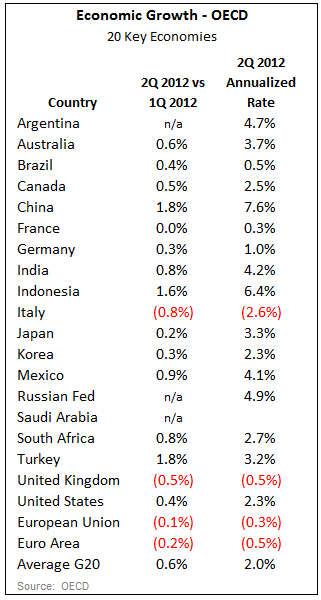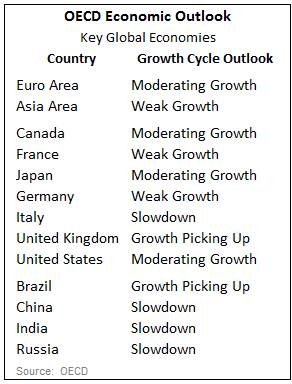IDEX Online Research: Global Economy Continues to Soften, Says OECD
October 16, 12
(IDEX Online) – Economic growth in the world’s twenty largest economies slowed in the second quarter of 2012, and the outlook calls for “continued loss of momentum in most major economies,” according to the OECD.
Second quarter Gross Domestic Product (GDP) in the so-called G20 countries, which include the largest mature and emerging nations, increased by a very modest 0.6 percent from the first quarter. This was 0.1 percent slower growth than the first quarter’s 0.7 percent gain. Further, second quarter economic growth marks the third consecutive quarter of slowing growth among the world’s twenty largest nations.
However, the OECD noted that this slowing growth masks diverging patterns across various economies.
· Second quarter growth accelerated in Brazil, China, Indonesia, South Africa and Turkey.
· Growth slowed strongly in Australia, Japan, and Korea.
· Growth decelerated more moderately in Germany, India, Mexico, and the U.S.
· Growth rates were basically unchanged in Canada and France.
· GDP contracted for the third consecutive quarter in the United Kingdom, and for the fourth consecutive quarter in Italy. GDP contracted by 0.1 percent in the European Union, and by 0.2 percent in the euro area.
The following table summarizes quarter-to-quarter changes in economic growth as well as year-over-year annualized trends in the economies of the twenty largest nations that make up the G20.
 |
Outlook: Growth Momentum Slowing
The OECD’s composite leading economic indicators, designed to anticipate turning points in economic activity, show that the loss of momentum is likely to persist in the coming quarters in most major global economies.
Here are the highlights of the OECD economic forecast:
· Leading indicators point to a slowdown in Italy, China, India, and Russia.
· Growth is expected to be weak in France, Germany, and the Euro Area.
· The U.S., Japan, and Canada can expect their economies to experience a moderating growth rate.
· The leading indicators point to a pick-up in the economies of the United Kingdom and Brazil. There are some signs of possible resilience in Asian economies, though there are also signs of weakening; in other words, these economies are at a tipping point.
The following table summarizes the OECD forecast for major global economies.
 |
Other Economic Indicators Suggest Weakening
The unemployment rate for the OECD area increased slightly to 8.0 percent in July 2012, compared with 7.9 percent in the previous month. It is notable that the unemployment rates are widely varied across countries. Spain’s unemployment rate is 25.1 percent, followed by Portugal at 15.7 percent. In contrast, unemployment rates remained below 5.5 percent in Australia, Austria, Germany, Japan, Korea, Luxembourg, Mexico, and the Netherlands.
The annual inflation rate eased slightly to 1.9 percent in July in the OECD area, down from 2.0 in June. This easing is a sign of slowing economic growth, and it reflects lower inflation rates for energy and food prices.